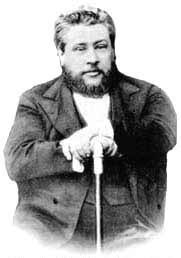Your weekly Dose of Spurgeon
 The PyroManiacs devote some space each weekend to highlights from the lifetime of works from the Prince of Preachers, Charles Haddon Spurgeon. The following excerpt is from the Metropolitan Tabernacle Pulpit, volume 49, sermon number 2,824, "Mocked of the soldiers."
"Far be it from us to seek a crown of honour where our Lord found a coronet of thorn."
The PyroManiacs devote some space each weekend to highlights from the lifetime of works from the Prince of Preachers, Charles Haddon Spurgeon. The following excerpt is from the Metropolitan Tabernacle Pulpit, volume 49, sermon number 2,824, "Mocked of the soldiers."
"Far be it from us to seek a crown of honour where our Lord found a coronet of thorn."
I do
believe—I cannot help believing—that our blessed Master, when he
was in the hands of those cruel soldiers, and they crowned him with
thorns, bowed before him in mock reverence, and insulted him in every
possible way, all the while looked behind the curtain of the visible
circumstances, and saw that the heartless pantomime,—nay,
tragedy,—only partially hid the divine reality, for he was a King,
even then, and he had a throne, and that thorn-crown was the
emblem of the diadem of universal sovereignty that shall, in due
season, adorn his blessed brow; that reed was to him a type of the
sceptre which he shall yet wield as King of kings, and Lord of lords; and when they said, “Hail, King of the Jews!” he heard, behind
that mocking cry, the triumphant note of his future glory,
“Hallelujah! Hallelujah! Hallelujah! The Lord God omnipotent
reigneth; and he shall reign for ever and ever!” for when they
mockingly bowed the knee to him, he saw all nations really bowing
before him, and his enemies licking the dust at his feet.
Our Saviour
knew that these ribald soldiers, unconsciously to themselves, were
setting before him pictures of the great reward of his soul-travail.
Let us not be discouraged if we have to endure anything of the same
sort as our Lord suffered. He was not discouraged, but remained
steadfast through it all. Mockery is the unintentional homage which
falsehood pays to truth. Scorn is the unconscious praise which sin
gives to holiness.
What higher tribute could these soldiers give to
Christ than to spit upon him? If Christ had received honour from such
men, there would have been no honour in it to him. You know how even a
heathen moralist, when they said to him, “So-and-So spoke well of
you yesterday in the market,” asked, “What have I done amiss that
such a wretch as that should speak well of me?”
He rightly counted
it a disgrace to be praised by a bad man; and because our Lord had
done nothing amiss, all that these men could do was to speak ill of him, and treat him with contumely, for their nature and character
were the very opposite of his.
Representing, as these soldiers did,
the unregenerate, God-hating world, I say that their scorn was the
truest reverence that they could offer to Christ while they continued
as they were; and so, at the back of persecution, at the back of
heresy, at the back of the hatred of ungodly men to the cross of
Christ, I see his everlasting kingdom advancing, and I believe that
“the mountain of the Lord’s house shall be exalted above the
hills,” and that “all nations shall flow unto it,” even as
Isaiah foretold; that Jesus shall sit upon the throne of David, and
that of the increase of his kingdom there shall be no end, for the
kings of the earth shall bring their glory and honour unto him, “and he shall reign for ever and ever. Hallelujah!”
Glory be to his holy
name!











No comments:
Post a Comment